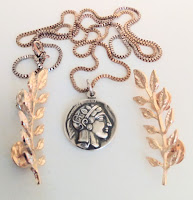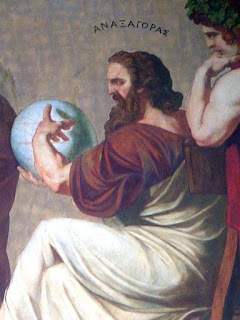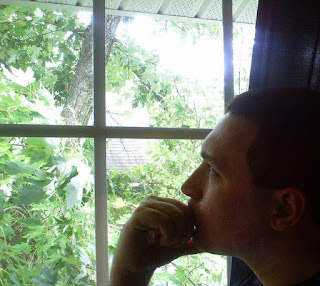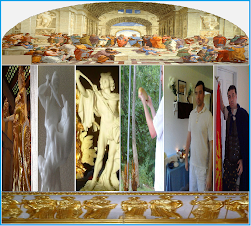Monday, December 16, 2024
Find The Love Of The Gods In This Room
Wednesday, July 31, 2024
My Little Spot In The Universe Is What Matters
Wednesday, July 3, 2024
The Heart and Brain Think Differently. Why?
More so, the Gods are able to appeal that ethical side to me because of the fact that they enabled me with the emotional capacity for empathy and compassion. If I had no emotion, I could do whatever I wanted to other living creatures and indeed the world around me. No matter what the Gods or humans told me, I would be unable to feel or understand it, and that would be a recipe for disaster.
The same goes for other people. The reason we don't abandon our children, spouses or loved ones is because our emotional states will not allow it. Our ability to love and feel keeps us moral and honorable.
If we didn't have that capacity, our species would de-evolve into extinction. The Gods gave it to us because it was necessary for our survival and the prosperity of everything around us. And if we encounter someone who fails to show emotion, such as a sociopath, we consider them to be mentally ill, not a natural production. Realizing this about ourselves is crucial to beginning to understand the genius of the Gods and the intelligence behind our natural existence.
Monday, July 1, 2024
None Are Without Opportunity In Hellenism
Sunday, June 23, 2024
You'll Feel Like You Die A Little
Wednesday, June 19, 2024
Have You Really Thought About How Wonderful Life Is?
Sunday, June 16, 2024
You're Never Done, It's Never Over
Sunday, January 21, 2024
It's My Fate
Tuesday, December 19, 2023
Life's Altar Blocks Are Always Drenched In Blood
Sunday, July 2, 2023
Pendants From Greece Hold More Natural Power
Wednesday, June 28, 2023
Humans Aren't Gods, and Pagan Groups Need To Stop Telling People They Are
Monday, June 26, 2023
Why Live On? The Gods Give Us Plenty of Reasons
Tuesday, June 13, 2023
Mythology/Theology: To The Greeks, There Was A Difference
The first mistake modern people make is thinking all religions are the same, and thus, they assume that the ancient Greeks had a "holy book" of religion and myth. This is utterly false.
Not only was ancient Greece a collection of City States completely independent from one another in government and beliefs, but there was no law dictating how someone could view the Gods or what stories they could accept or not.
In fact, it's kind of inaccurate to call it "The Ancient Greek Religion" because there were, in fact, many forms of ancient Greek religion and Cult. Sparta and Athens, for example, believed in the same Gods but did not have the same religion or culture. Not to mention the fact that there were cults everywhere that adhered to their own identities.
So for instance, someone today might say that my beliefs on Artemis being gracious and kind to people is skewed considering the myth of Actaeon, but there's literally nothing in Hellenic religion which says I have to accept that story as literal fact or accept it at all. It's not like Christianity or Islam where the title of the religion depends on the acceptance of one written book or "testament."
We do know that we believe in Artemis as She is, of course. But I don't have to believe everything that everyone tells me about Her. I have the right to my own experiences and perspectives, and it does not denote me as a Hellenist.
You can believe whatever you want about someone, but it doesn't change them. You can believe that Chris Aldridge is a shapeshifting, blood drinking vampire, but it does not make me one, nor does it make me guilty of said actions.
It's also true that not only could a given myth vary in detail from City to City, but many of them were handed down by word of mouth, which can change and modify with each teller, especially as the time and culture changes.
In fact, some of the myths we accept today as Greek, were not even composed by the Greeks. The story of raped Medusa that people commonly call Greek in our time, was actually written by a Roman. The original story, which says nothing of rape or punishment, was written by the Greek Hesiod.
This is also not a modern change to Hellenism either. Greeks were not forced to accept a given story. Historically, it's accepted that around the time of the Hellenistic Era, the myths as literal facts began to waiver as a concept.
But considering people like Plato and Sokrates, I think it began much sooner than that. Those men clearly believed in the Greek Gods but were also philosophers and not necessarily mythologists. They wrote about people's experiences with the Gods instead of taking written myths and saying, "Here's the 100% truth."
Hellenic religion can be hard to understand, but if you ever manage to grasp the core, it'll make perfect sense to you.
In the Goodness of the Gods, I'll see you at the next Herm down the road.
Chris Aldridge.
Monday, April 24, 2023
When The Soothsayer Showed Up The Scientist
*Literary- Aird, Hamish, Pericles, The Rise and Fall of Athenian Democracy, The Rosen Publishing Group, New York, New York, 2004, pp. 24-25.
Tuesday, December 20, 2022
How I Know The Gods Love Humanity
Monday, February 7, 2022
How Do You Release All Your Doubts?
Tuesday, January 4, 2022
Ask and The Gods Will Tell You, Every Time
Thursday, February 20, 2020
Thinking You're A God: Disappointment and Destruction
Wednesday, August 28, 2019
Why Do Bad Things Happen To Good People?
Tuesday, July 9, 2019
Are You Truly Socratic? It Can Change Your Life
Part of being Socratic, and really being Hellenic, is not to have arrogance in your beliefs, but confidence. Even in liberal groups like the Pagan community, you can find people who will tell you that you are doing things wrong with your religion or spirituality. When I was a Neo-Pagan, I had people left and right telling me I was wrong, sometimes calling me a heretic. There are even rare times as a Reconstructionist when I encounter an individual I don't agree with. For example, I have read some Hellenists who don't pray to Greek Heroes outside of Herakles, because they believe it to be a localized custom and not relevant or appropriate for someone outside of that locality. Many years back, I even met a guy who didn't believe that humans can talk to the Gods directly, but that we have to ask lower spirits for intercession, essentially. While these people may be a minority in the community, they still exist. Of course, I disagree with all of their views. One might call be a "PanHellene," because I incorporate ancient Greek spirituality from everywhere in the religion. I pray to all and firmly believe that we can talk directly to any level of Divinity, but if I allowed their opinions to tell me how to think about the Gods and my religion, I'd never feel spiritual or anything like myself. I have enough confidence in my own beliefs and views that I'm never thrown off my course. For the longest time, I allowed myself to be disrupted through a lack of confidence, and eventually, grew sick to death of it. I became tired of letting other people, even those close to me, tell me what to think or how to feel. You'll notice that you feel depressed, enslaved, even hopeless when you allow this to happen, but when you finally become an individual, you feel liberated. There's a reason for that, the reason being that you were always meant to be your own person.
This doesn't just go for religion and spirituality either, but all things that make you an individual. If we allow other people to tell us what to think, or how to feel, we will have a change in our minds and emotions every single day of our lives, because there's always going to be someone with a difference or disagreement. When you let someone put their own mind inside your head, you've lost all.
In the Goodness of the Gods,
Chris Aldridge.


















